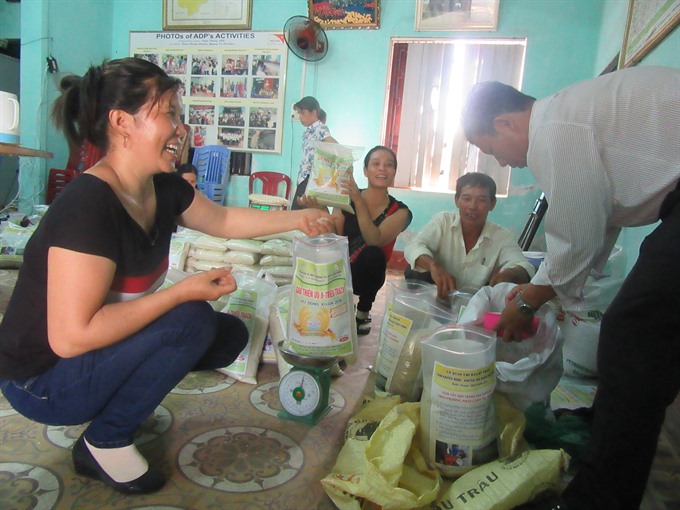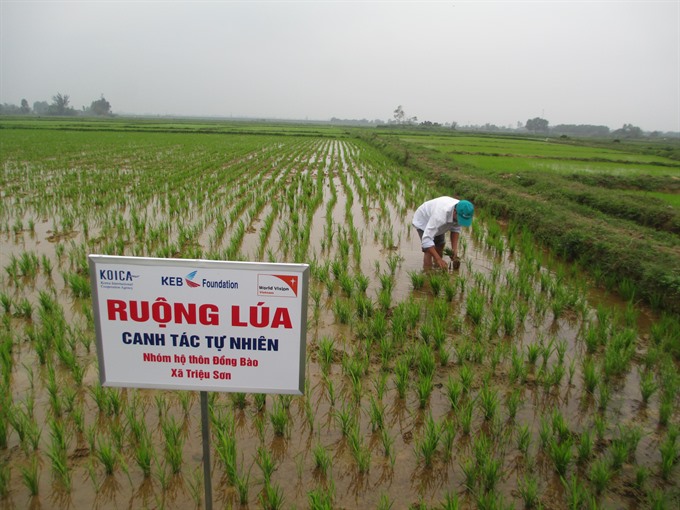 Society
Society

For the first time, poor farmers and those from ethnic minorities groups of central Quảng Trị Province have approached organic agriculture projects, helping them to get out of poverty and maintain their livelihoods.
 |
| Farmers pack rice products made by themselves. Donors of an organic farming project have also helped sell the produce and products. — Photo courtesy of World Vision Việt Nam |
Khánh Dương
QUẢNG TRỊ — For the first time, poor farmers in Quảng Trị Province, including those belonging to ethnic minority groups, are getting serious about organic farming.
Unlike earlier, when the use of chemical fertilizers and pesticides was seen as indispensable to boosting productivity and remaining competitive, thousands of farming households see organic farming offering sustainable livelihood and a way out of poverty.
The change in attitude has resulted from projects supported by New Zealand’s Aid Programme, Korean International Cooperation Agency (KOICA) and World Vision Việt Nam.
The project has taught more than 1,500 farmers in the province learned to farm without using any chemical products, including pesticides, herbicides, chemical fertilisers and preservatives.
The projects, funded with a budget of more than US$ 3 million, the projects targeted neediest farmers, offering them easily applicable know-how as well as markets to buy their produce.
They demonstrate that organic farming is a way to protect soil fertility, safeguard water resources and ensure food security.
In Triệu Phong District, for instance, farmers have been instructed to make chemical-free pesticides with garlic, chilli, onions and other products that are easily available.
“Following this natural farming method, I compost organic fertiliser using agricultural waste and livestock manure. I use ginger, chilli and garlic to prevent pests and treat plant diseases. Although this involves more work, it is not harmful to my health,” said Nguyễn Thị Lan, a farmer in Triệu Phong.
According to the provincial Department of Agriculture and Rural Development, the new farming method has brought farmers profits twice as high as normal, because expenses on fertilizers and pesticides have been reduced while productivity remains the same or even improves.
It has also helped improve soil quality, and mitigated unemployment in the project areas, the department says.
Since shifting to organic farming, farmers no longer have to invest in machines. Since everything in organic rice farming is done by hand, more and more unemployed members in farming households can lend a hand.
Fighting malnutrition
In Hải Lăng District, farmers learnt to engage in organic poultry farming.
The initial aim of the project in this district is to produce high-quality chicken in order to provide nutritious meals to malnourished children below five years of age.
More than 200 households in the district’s four communes of Hải Quy, Hải Thiện, Hải Thành and Hải Dương have been supported with stock, knowledge and skills. Chicken are fed with natural food grown in the farm itself, like rice, corn, beans and fermented products to keep them healthy and resistant to diseases.
Farmers taking part in the project do not use any antibiotics, industrial food or banned substances.
“We focus on disease prevention among chickens with vaccines, so the number of deaths decreased. Eggs are “clean” and nutritious when taken from healthy chickens,” said Đặng Bá Thanh, a farmer in Hải Lăng Commune.
“Thanks to the project, we heard about organic farming methods for the first time. We can now sell chicken and eggs and earn money to buy food and clothes for children,” he said.
This project has not only boosted children’s health, it has also supported the livelihoods of local farmers.
Quality, not quantity
In Hướng Hóa District, the project has supported more than 1,200 poor households belonging to ethnic minority groups grow coffee beans, cassava and ginger through organic farming.
The district, which has a large area of bazan soil, grows coffee on 300ha and ginger on 100ha. However, locals did not know how to make their farms profitable. The project taught them new techniques and also sought partners to ensure buyers for the produce.
Tom Wilson, Head of the New Zealand Aid Programme, said: “Our partnership with World Vision is delivering real benefits to coffee, ginger and cassava farmers of Quảng Trị. By helping farmers with safe production techniques, and linking them to markets, we are seeing real increases in household income.
“The coffee farmers have shifted their focus from producing big volumes of coffee to producing the highest possible quality. They take pride in how good and clean their coffee is; they are starting to build a brand based on quality; and they work with reputable dealers and processors,” he said.
“Sustainable economic development is the key to poverty elimination and in turn, the well-being of children. We constantly seek co-operation with governments, institutions, and the corporate sector to realise this philosophy, replacing temporary traditional aid handouts with the provision of tools and market linkages for needy farmers to create lasting impacts,” said Trần Thu Huyền, National Director of World Vision Việt Nam.
Produce grown by Quảng Trị farmers were on display at the Việt Nam Regional Specialty fair at Vincom Mega Mall Royal City in Hà Nội from December 1-4.
Nguyễn Thị Linh, a customer at the Quảng Trị farmers’ booth, said: “Consumer demand for organic products have been on the rise as more and more information comes out about harmful effects of pesticide-laden or tainted food.
“As a customer, I totally trust in organic farm produce like this, especially produced by poor farmers. Buying their produce is a way to support them and support development of Vietnamese organic agriculture.” — VNS
 |
| A farmer in Triệu Sơn Commune, Triệu Phong District plants rice under an organic farming project supported by international donors. — Photo courtesy of World Vision Việt Nam |




